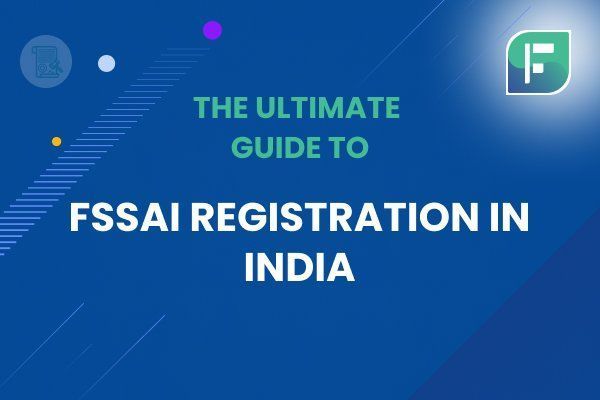Food safety is of utmost importance in India, and the Food Safety and Standards Authority of India (FSSAI) is the regulatory body that ensures the safety and quality of food products in the country. In this blog, we will explore what FSSAI registration or license is, who should obtain it, the benefits of obtaining it, the necessary documents required, where to apply, and entities that are exempt from it.
Understanding FSSAI
FSSAI stands for the Food Safety and Standards Authority of India. It is a regulatory body that was established under the Food Safety and Standards Act of 2006. The FSSAI is responsible for regulating and supervising food safety in India. The primary objective of FSSAI is to ensure the safety and quality of food products that are sold in India. It sets standards for food products and regulates their manufacture, storage, distribution, sale, and import.
What is an FSSAI license?
The FSSAI license or registration certifies that the business has complied with the safety and quality standards set by the FSSAI. It also helps to build customer trust by ensuring that the food products they consume are safe and high-quality.
Who should register?
Any business entity that is involved in the manufacture, storage, distribution, or sale of food products in India should register with the Food Safety and Standards Authority of India (FSSAI). This includes:
- Food manufacturers and processors
- Traders and retailers
- Small food businesses like street food vendors, food stalls, and small eateries
- Importers and exporters of food products
- Storage units and warehouses
- Caterers and food service providers
- Food packaging units
- Online food business operators
Registration with FSSAI is mandatory for food businesses with an annual turnover of up to Rs. 12 lakhs. Businesses with an annual turnover exceeding Rs. 12 lakhs must obtain an FSSAI license. FSSAI license are also necessary for businesses looking to expand their operations or diversify their product range.
Who is exempted?
There are a few entities that are exempt from obtaining an FSSAI license in India. These include:
Small Food Businesses:
Food businesses with an annual turnover of up to Rs. 12 lakhs are exempt from obtaining an FSSAI license. However, they must obtain an FSSAI registration.
Petty Retailers:
Petty retailers who sell food products directly to consumers and do not have any processing or packaging unit are exempt from obtaining an FSSAI license.
Food Manufacturers for Personal Consumption:
Food manufacturers who manufacture food products for personal consumption or distribution among friends and family are exempt from obtaining an FSSAI license.
Food Business for Religious Functions:
Food businesses that are run by religious or charitable institutions for distributing food during religious or charitable functions are exempt from obtaining an FSSAI license.
Benefits of FSSAI registration in India
There are several benefits of obtaining an FSSAI registration or license in India:
Legal Compliance:
FSSAI registration or license is mandatory for all food businesses in India. By obtaining an FSSAI license, businesses can ensure that they comply with the legal requirements and avoid any penalties or legal action.
Consumer Trust:
FSSAI license is a mark of quality and safety. It assures consumers that the food products they are buying or consuming meet the prescribed standards and are safe for consumption.
Business Expansion:
FSSAI license is necessary for businesses looking to expand their operations or diversify their product range. It is also a requirement for obtaining various government licenses and permits.
Competitive Edge:
FSSAI registration or license provides a competitive edge to the business as it sets them apart from unregistered or unlicensed businesses.
Brand Reputation:
FSSAI registration or license enhances the brand reputation of the business as it assures consumers of the quality and safety of their products.
Export Opportunities:
FSSAI registration or license is a prerequisite for exporting food products from India to other countries. By obtaining an FSSAI registration or license, businesses can tap into the lucrative export market.
Where to Apply for FSSAI registration in India?
The Food Safety and Standards Authority of India (FSSAI) allows businesses to apply for FSSAI registration or license through its online portal. Here are the steps to apply for an FSSAI registration or license:
- Visit the FSSAI website at https://www.fssai.gov.in/.
- Click on the “Registration and Licensing” tab on the top menu.
- Select “Registration” or “License” based on the category of the business.
- Fill in the required details in the online application form.
- Upload the necessary documents.
- Pay the application fee online.
- Submit the application.
After submitting the application, the FSSAI will verify the documents and may conduct an inspection of the food business premises. Once the application is approved, the FSSAI will issue the registration or license certificate. It is important to ensure that all the necessary documents and details are accurate and complete to avoid any delays or rejections in the application process.
Conclusion
The Food Safety and Standards Authority of India (FSSAI) is an essential regulatory body that ensures the safety and quality of food products in India. FSSAI registration or license is mandatory for businesses involved in the manufacture, storage, distribution, or sale of food products in India.





 Call to Expert
Call to Expert